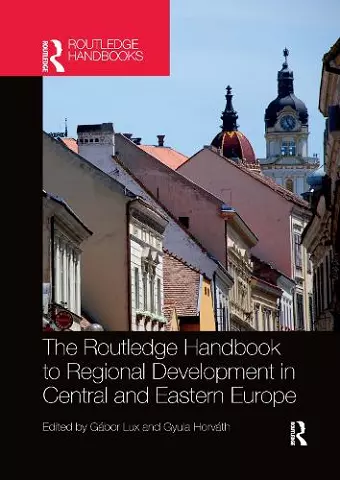The Routledge Handbook to Regional Development in Central and Eastern Europe
Gábor Lux editor Gyula Horváth editor
Format:Paperback
Publisher:Taylor & Francis Ltd
Published:30th Sep '20
Currently unavailable, and unfortunately no date known when it will be back
This paperback is available in another edition too:
- Hardback£220.00(9781472485717)

Twenty-five years into transformation, Central and Eastern European regions have undergone substantial socio-economic restructuring, integrating into European and global networks and producing new patterns of regional differentiation and development. Yet post-socialist modernisation has not been without its contradictions, manifesting in increasing social and territorial inequalities. Recent studies also suggest there are apparent limits to post-socialist growth models, accompanying a new set of challenges within an increasingly uncertain world.
Aiming to deliver a new synthesis of regional development issues at the crossroads between ‘post-socialism’ and ‘post-transition’, this book identifies the main driving forces of spatial restructuring in Central and Eastern Europe, and charts the different regional development paths which take shape against the backdrop of post-crisis Europe. A comparative approach is used to highlight common development challenges and the underlying patterns of socio-economic differentiation alike. The issues investigated within the Handbook extend to a discussion of the varied economic consequences of transition, the social structures and institutional systems which underpin development processes, and the broadly understood sustainability of Central and Eastern Europe’s current development model.
This book will be of interest to academics and policymakers working in the fields of regional studies, economic geography, development studies and policy.
"The reviewed book represents a reference work summarizing the main characteristics of regional development issues in Central and East European countries, members of the European Union. It is a synthesis of the structural characteristics, differences and common features of regional development with a focus on the socio-economic processes. Among the most effective parts of the book, I would like to mention its synthetic character: the authors managed to provide a comprehensive view on regional development issues in the CEE region. Such a study closes a significant gap in the scientific knowledge of this region. Of particular interest, in my opinion, is the cross-cutting issue, which can be identified across all the chapters of the book, namely, evidencing the role of capital cities and metropolitan regions, which seem to be more integrated into the broader European urban system than within their own hinterland."
- Igor SÎrodoev Ovidius, University of Constanta and University of Bucharest, Romania
ISBN: 9780367660048
Dimensions: unknown
Weight: 630g
324 pages